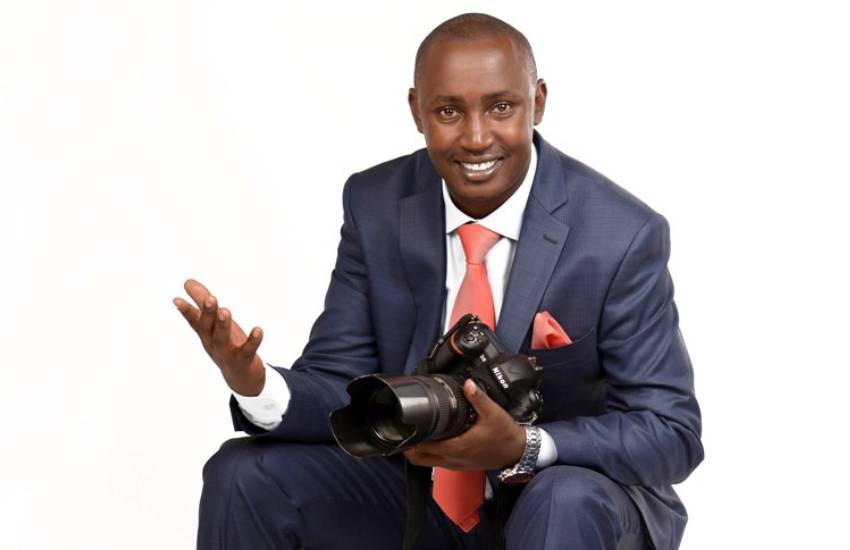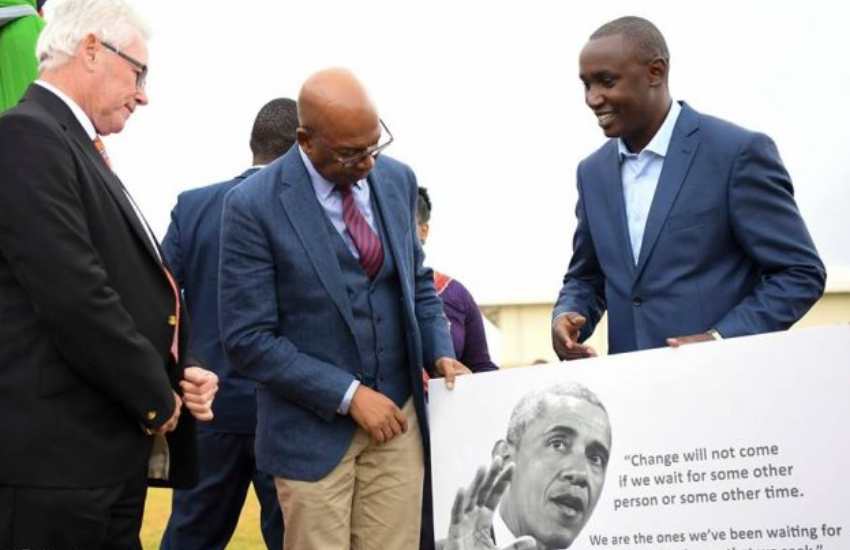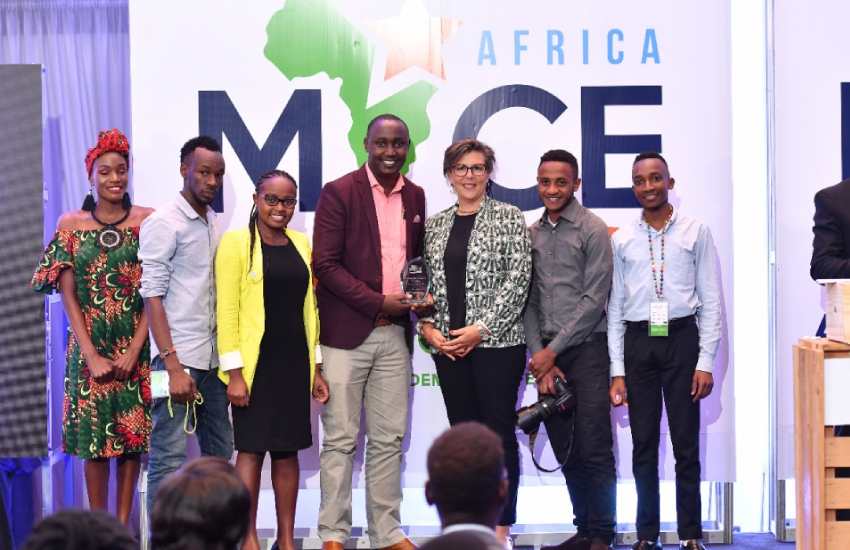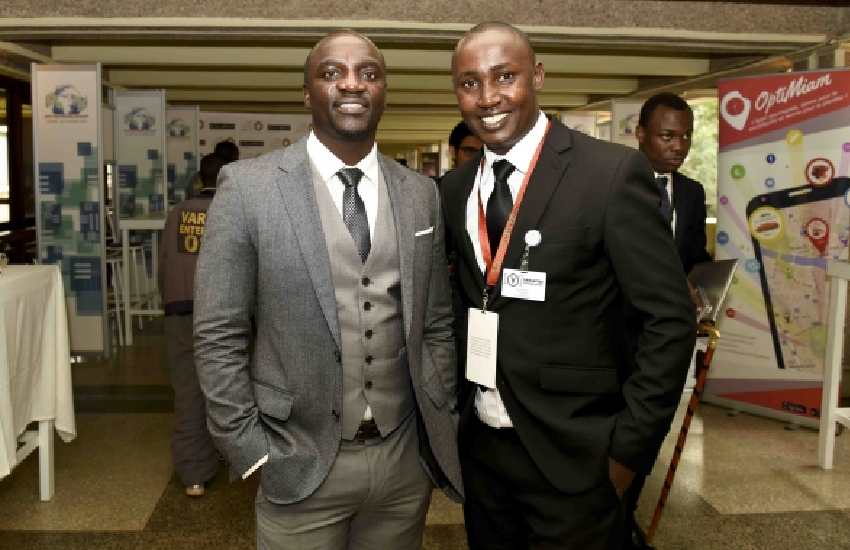
David Macharia, the lead creative photographer at Versatile Photographers, began his photography business by taking pictures of house helps in Kangemi back in 2003. He owned no camera, but relied on friends to lend him any camera that was not in use. The house helps marketed Macharia to their bosses. In turn, these employers introduced Macharia to the corporate world, and his photo world began to take shape.
In 2007, he registered a company and started using a friend’s office and computer. For a studio, he would make do with the office corridors, especially on weekends when workers were away. Today, Versatile Photographers has grown into an agency that runs several brands, including Versatile School of Photography, Versatile Adventures, Versatile Etiquette, Versatile Creative Hub, Africa Stock Images and Photography by David Macharia. Macharia has since moved from the corridors to opening state of the art studios in the city centre and The Village Market, Gigiri. He talks about catching moles for a living to photographing Barrack Obama.
Tell us about the Obama moment
It all began when a client approached me to cover a funeral. Unknown to me, I had just met a person who had strong contacts with the American Embassy. This connection would later get me assigned as the official photographer of President Barack Obama when he visited Kenya for the Global Entrepreneurship Summit. That is when I truly grasped that humility and treating everyone you meet with respect can take you places. Had I played down the funeral assignment, I would not have landed a job that changed the direction of my career.

How did the Obama job catapult your career to greater heights?
In Kenya, it is difficult for financial institutions to give loans to the creative industry without collateral. However, when the White House paid me for the Obama assignment, I was able to expand and start a photography school, an achievement, if I may say so, that revolutionised the field of photography in Africa.
Read Also: How I became king of graffiti - Moha Grafix
How did it all begin?
When I came to Nairobi after high school, I landed an internship at a photography studio along Latema Road. I had no experience, no skill, and of course, no money. I only had a passion to succeed. I took the best success lessons at this studio. Since I wore a Kodak-branded t-shirt, many assumed I was a photographer and started asking for my services. That is how I saw an opportunity and started learning all I could about photography. I consulted photographers who brought pictures to the studio for processing, among them, Muturi Kanini whose work inspired me the most. I earned peanuts in the studio, but this short stint became my stepping stone to a successful career in photography. I learnt that you can start anywhere, with nothing, and still achieve the heights of success.
Had you ever considered entrepreneurship prior to this?
My lessons on business success started in 1993 while in primary school in Njabini, Nyandarua County. I started out as a mole catcher. The local mole catcher contracted by local farmers would lie to my father that he had caught some moles on our farm while in fact, he had trapped them in neighbouring farms. I learned by watching him and then executed the idea. I also cut my costs and by extension, prices by half. Farmers hired me often, for Sh5 a mole, or Sh20 a week. Today, a print of one of my most popular pictures goes for $1,200. Business is about identifying a problem and planning how to solve it. Business is about competition. Healthy, smart, but sustainable competition.

How did you turn your passion for photography into a business without much higher education?
I started out without a role model and had to learn from my own mistakes. I like to call myself an artpreneur- someone who develops an art into a business. Being in business is like being in the kitchen, and in the kitchen, there is fire. I was prepared to get burned. In the process, however, I learnt a lot. I developed an interest, learnt the skills needed to succeed and identified people who could guide and help me to achieve my goal. I then went back to the kitchen and began the execution. I wanted to stand out in a unique manner. I built a portfolio too.
How did building a portfolio help you?
I saw the kind of pictures published in international magazines and was deeply inspired to build a career in photography. I wanted to see my work published too. During assignments, I stalked international photographers with questions and the answers fed into my dream. Today, my work has been published on the international stage. This would not have happened if I did not develop a portfolio to market myself. It makes you stand out. Even those who may not like you in person might be deeply inspired by your portfolio.
Read Also: My playful hobby turned into a goldmine – 'Faiba' animator
What is the worst business mistake you have made thus far?
I once hired the wrong team that lacked integrity. I made some good money and because I had no concrete structures, they used these loopholes to steal from me and my clients.
You use a unique business structure. Tell us about that.
I do not hire permanent staff to work for me. I encourage those I train to start their own businesses. Then I partner with their businesses whenever I have a big job. That way, they make money through my connections. The only full-time employee I have is my personal assistant.

What is the best business advice you have ever received?
I learnt from an online class that I must invest in business structures such as marketing, accounting and training systems. This is because people in the creative business are not necessarily good managers. These systems also prepare you for a smooth exit from the business.
What I have learnt about standing out from competition
1. Can people trust your word?
Viable relationships come from a stable network. For example, I started out by taking pictures of house helps in Kangemi. Unlike other photographers who took a week, I delivered the prints a day later using smart envelopes. I built a network of clients who trusted me and my work. The overwhelming requests for photos made me leave employment to venture out on my own. If I had given mediocre service to the house helps, they would not have recommended me to their employers, who in turn introduced me to the corporate world. You only build viable relationships by giving quality service.
2. Integrity is a currency. Make it
Look, when I started out, I had no camera and had to borrow one from other established photographers. Had I lacked the integrity needed, I would not have taken care of the equipment or returned it in perfect condition. Such integrity helps me to sell not just products but value to my clients. It helps me avoid giving mediocre services or betray my client’s trust. Similarly, turn up for that job and deliver the best you can, giving your client an experience to remember. Integrity is the lift to business success.
Read Also: 6 habits of perpetually broke people
3. Continuous learning is where it’s at.
Though I did not learn photography from a college of higher learning, I needed to have an idea of how photography works. I mastered my craft before passing on the skill to my team. That helped me know who to cooperate with for the progress of my brand. I was also able to understand the market and tailor my packages for different clients. As an entrepreneur, you need to understand the entire chain of your business. For instance, if you are an events planner, you must understand venues in advance so that you can recommend them to clients. Knowing how your industry works equips you with the wisdom to be creative enough and to package yourself as a brand in the best way possible.
 The Standard Group Plc is a multi-media organization with investments in media
platforms spanning newspaper print
operations, television, radio broadcasting, digital and online services. The
Standard Group is recognized as a
leading multi-media house in Kenya with a key influence in matters of national and
international interest.
The Standard Group Plc is a multi-media organization with investments in media
platforms spanning newspaper print
operations, television, radio broadcasting, digital and online services. The
Standard Group is recognized as a
leading multi-media house in Kenya with a key influence in matters of national and
international interest.



